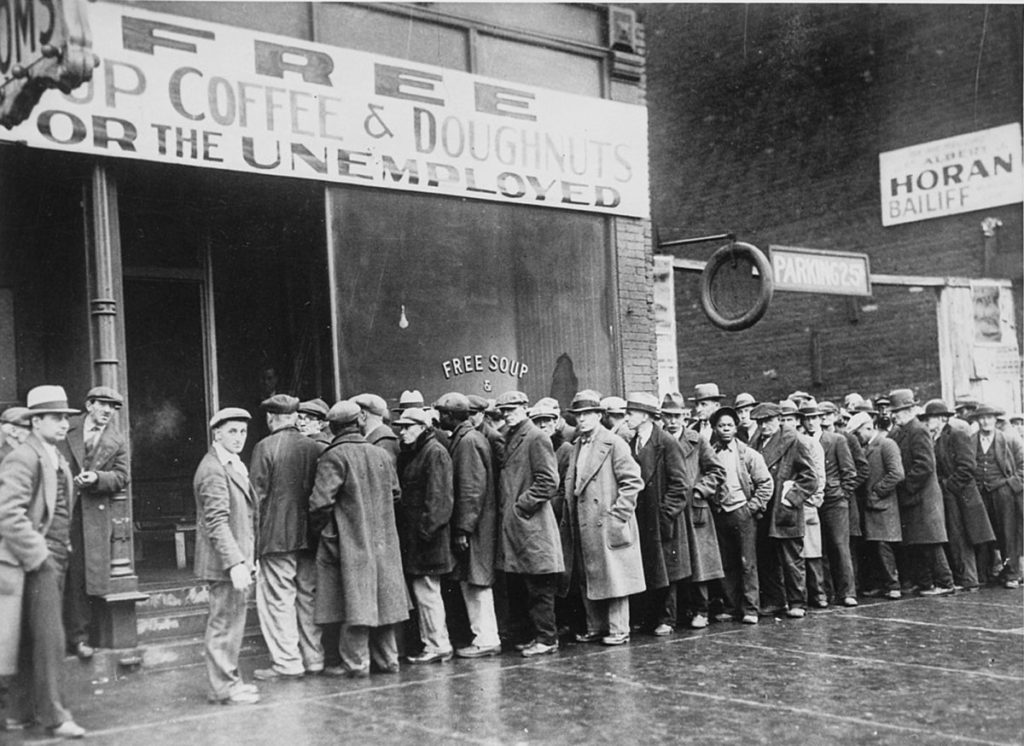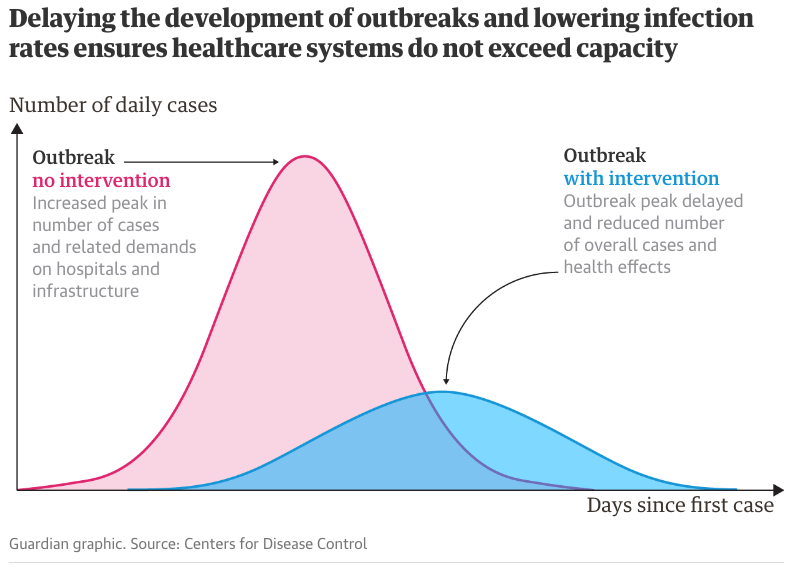
Unpopular opinion: In a couple of months we’ll probably see the global lockdown strategy to tackle COVID-19 is flawed and unworkable.
I believe there’s a very high probability the strategy of isolating everyone as much as possible that is being pursued across the world will crash the global economy.
Note: This is a bad thing.
If you think we have political/inequality problems now, you won’t like it better with a couple of million suddenly unemployed in the UK alone, alongside tens of thousands of bankrupt businesses.
When virus fears go viral
We’re lucky this virus overwhelmingly kills only the elderly or vulnerable. This should give us a fighting chance to respond flexibly, compared to if everyone was equally likely to be killed by it.
However there’s little suggestion of that in the tactics to-date.
I’m definitely NOT saying do-nothing to mitigate the spread. But I struggle with the logic of the current universal approach.
Yes, like everyone I’ve seen and shared the flattening the curve graphs. And I too find the argument very convincing:

But again, rather than “all in it together” I can’t see why for instance we don’t try to reduce escalation of hospital cases by extremely isolating the more vulnerable to try to reduce the hospital load.
This would then leave the rest of us soldiering on to keep the economy going – and to get on with getting and shaking off the virus, which is exactly what is needed in the long run.
Is the immediate lockdown aiming to buy time to get through the first wave, to make more ventilators, et cetera?
If so, then let’s communicate that it’s a one-time drastic measure. That might reduce uncertainty and enable businesses to plan and raise financing, rather than giving up and firing staff or folding.
Any vaccine is 12-18 months away, so the plan can’t be meant to get us to that, surely?
Is total lockdown the solution because even if COVID-19 only kills say 0.2-0.4% of under-60s, that’s still a huge number?
That makes some sense, though I’d like to see how the 0.2% for the youngest cohorts is further segmented according to existing health conditions (as would everyone else, I know.)
Perhaps the epidemiologists are correctly telling us that the more comprehensive the lockdown, the fewer COVID-19 deaths.
But does their analysis take into account all the non-virus externalities caused by such a lockdown?
And how many of the old and vulnerable cohort predicted to die by the models would have – very sadly – died anyway over the lengthy forecast period?
Misheard immunity
On balance, I suspect the initial – misunderstood – approach by the UK government was probably along the right lines, if flawed in presentation and implementation.
It did not seem to do much to specifically isolate the old – probably for political reasons – to the extent that the populace took the strategy to be aimed at deliberately killing them.
Nor was there much emphasis on the quick and easy wins of social distancing – versus later guidance to self-isolate and avoid pubs and restaurants, which is going to be economically ruinous.
But it at least foreshadowed the elephant in the room: that most of us are going to (and need to) get this virus.
In my (clueless) opinion it would make much more sense for everyone over-65/vulnerable and their carers to be isolated indefinitely (i.e. stay inside, food delivery at a distance of five-foot from the front door) and for the government to spend several tens of billions mobilising the army/others to deliver food and other essentials and give income support until the threat abates.
The cost would be astronomical, but it would be targeted and will anyway probably be less than seeing a self-inflicted economic armageddon because you tried to lock away everyone in the prime of their productive lives and blew up several vital sectors (e.g. hospitality, retail) doing so.
The vast majority of the non-vulnerable could then aim to social distance according to the 80/20 rule, rather than Prepper-style…
- Keep apart from one another
- Wash our hands regularly and without fail
- Zero hugs, zero kisses, zero handshakes
- Stay at home when we get the virus
- Sensible social restrictions where greatest modelled impact
- Use hand sanitiser gel like Howard Hughes having a bad day
- More regular cleaning of communal spaces, especially fomites like door handles, counters, and lift buttons
…but otherwise life, work, eating out, and buying a latte goes on.
The virus would spread, but social distancing could slow it down.
The cost of economic collapse
A deep recession will cause untold personal misery for millions, and smash tax revenues.
There will be less money for hospitals, schools, nurses, and the rest of the Richard Scarry professions. Poor kids will grow up with greater food insecurity. Relationships will break down.
More immediately, closing GP surgeries for instance means children’s rashes going undiagnosed, odd lumps not spotted. People are going to die anyway due to lockdown, albeit fewer from COVID-19.
Calls for economic stimulus as an offsetting response are misguided. You don’t electroshock a patient you deliberately put into a coma.
Direct loans/grants for individuals/businesses are much more sensible but I doubt they can stave off a big recession.
Eternal return
The full lockdown strategy would be a clear winner if the current COVID-19 outbreak was a one-time event.
But I’ve not heard anyone explain how given we got to today’s state from just a handful of hapless travellers bringing us the virus mere weeks ago – from the very few places in the world where it was at that point established – why it won’t keep happening repeatedly until we get a vaccine or treatment, or until we’ve mostly all had it.
The current Draconian lockdown probably won’t even work therefore and will be abandoned. The cost will be for nothing.
I’m following the official government guidance and I think you should, too. This isn’t a call for anarchism.
But we will probably have to do something different soon.
Update: New data suggests more young people are being hospitalised than was reported earlier in the crisis. This would undermine the case for a more segmented approach to guidance.
From the FT:
Dr Mike Ryan, the WHO’s executive director, said two thirds of those who are in intensive care for the virus in Italy are under the age of 70, and 12 per cent are under 50. In South Korea, nearly a fifth of deaths were of people under 60, he said earlier in the week.
Interestingly, more than 80% of those who have tested positive for the virus in Germany are under-60. That said, given Germany’s low death rate and high testing, this could be seen as reassuring if it indicates the virus is actually quite widespread already.
Update 20 March 2020: I just went out to buy bread and (like every day this week) a socially-distanced latte from the small indie coffee shop in the station that is probably going to go bust after a month of this semi-lockdown.
The streets are full of old people shuffling around, chatting, not wearing masks, buying provisions. I counted them (this is in a subdued suburb of West London) and in a 20-minute walk I got to over 100 definite over-60s and more than 40 over-70s.
I would estimate about one-quarter of everyone I saw was in this vulnerable group. Anecdotal but suggestive.
At the same time today we have the government back-tracking on a rumoured London lockdown.
So to me it looks like the worst of both worlds — a half-baked London lockdown where people come and go at leisure (i.e. NOT what seemingly worked in Wuhan in China, which was much stricter) and at the same time a crashed economy – with as far as I can see a large potential COVID-19 exposure to elderly / vulnerable demographics.
I’m not saying my thought piece above is correct. But I maintain it’s a question worth asking. Especially given we don’t seem to be doing the lockdown properly.
Caveat: Armchair know-nothing non-epidemiologist, just musing aloud.